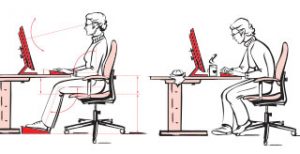- New Patient Line:
- (907) 336-0200
By taking steps to prevent worsening of even mild head injuries, and closely monitoring an individual who has sustained such an injury, you can prevent serious future complications and ensure a continued quality of life.
 The annual incidence of concussions in the United States is 1.6 to 3.8 million, and those caused by sport-related injuries are rising rapidly–particularly in youth sports. Although most concussion related symptoms resolve spontaneously within a week or less, it’s important to be aware that some will experience prolonged, intractable physical, cognitive, emotional, and sleep disturbances that can have severe long-term consequences–a situation called Post-Concussion Syndrome. Evidence strongly suggests that Post-Concussion Syndrome also puts individuals at risk for serious long-term consequences such as neurodegenerative diseases like Alzheimer’s. It’s important to be able to recognize signs of Post-Concussion Syndrome, especially if you have children who participate in youth sports like hockey and football where, in the heat of the moment, players and coaches can tend to minimize the danger of seemingly minor head injuries.
The annual incidence of concussions in the United States is 1.6 to 3.8 million, and those caused by sport-related injuries are rising rapidly–particularly in youth sports. Although most concussion related symptoms resolve spontaneously within a week or less, it’s important to be aware that some will experience prolonged, intractable physical, cognitive, emotional, and sleep disturbances that can have severe long-term consequences–a situation called Post-Concussion Syndrome. Evidence strongly suggests that Post-Concussion Syndrome also puts individuals at risk for serious long-term consequences such as neurodegenerative diseases like Alzheimer’s. It’s important to be able to recognize signs of Post-Concussion Syndrome, especially if you have children who participate in youth sports like hockey and football where, in the heat of the moment, players and coaches can tend to minimize the danger of seemingly minor head injuries.
An Ounce of Prevention is Worth a Pound of Cure
As a parent of a young person who’s had a head injury, the first and best thing to do is prevent any further or unnecessary brain injury. Following a mild traumatic brain injury (mTBI) like a concussion, the real danger is inflammation in the brain, which leads to a process called immunoexcitotoxicity. Immunexcitotoxicity leads to cell death and damages the connections between brain cells. While the body has mechanisms in place to deal with this inflammatory process, there are limits to its effectiveness, and any further injury can quickly overcome this ability, leading to severe brain swelling that has the potential to be fatal. The most important step to take following a mTBI like a concussion is the ensure that no further head injury occurs. The second step that should be taken is to reduce the inflammatory process that occurs in the brain following a head injury. A number of natural plant and animal compounds and extracts are very effective in accomplishing this. These compounds can halt the cascade of events that lead to cell death and brain damage.
- Fish Oil (Omega-3 fatty acids, specifically called DHA & EPA)
- Vitamin D3
- Curcumin
- Resveratrol
- Magnesium
- Green Tea (EGCG)
Watch for Signs of Post-Concussion Syndrome
By supporting healthy brain function and countering key inflammatory mechanism in the brain these compounds offer an effective way to reduce the impact of traumatic brain injuries. Beyond taking these steps, it’s important to monitor a young person who has sustained a mTBI in the weeks following the injury. Technically, Post-Concussion Syndrome requires at least 3 of the 4 following symptoms for a minimum of 4 weeks following injury:
- Headache
- Dizziness
- Sleep Problems
- Psychological Disturbances
- Cognitive Disturbances
By taking steps to prevent worsening of even mild head injuries, and closely monitoring an individual who has sustained such an injury, you can prevent serious future complications and ensure a continued quality of life.

